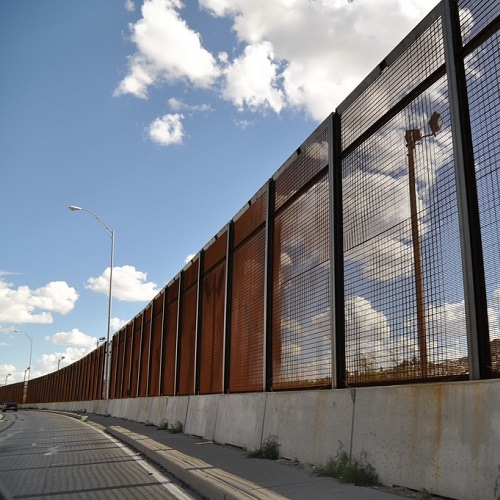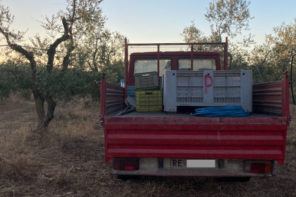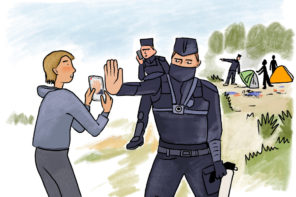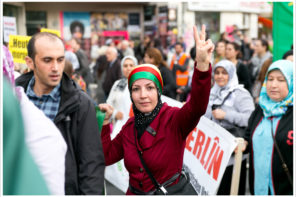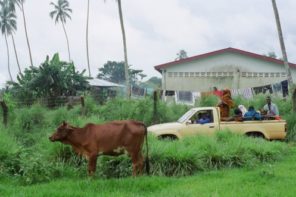Unless they are disrupted, deportations tend to go unnoticed. It is usually only the shocking deaths of deportees, or direct action of activists that draw our attention to the racialised violence of the deportation regime, which turns black and brown people into disposable, degraded subjects.
Most recently the injustice of immigration policies was made visible in the landmark trial of Stansted 15, a group of activists, who locked their bodies to the runaway of London’s Stansted airport and stopped a government-chartered flight due to deport 50 people to Nigeria and Ghana.
In their efforts to put an end to deportation, these activists protested against a border regime that destroys lives, tears families and friendships apart, and undermines people’s sense of belonging and identity. As a result of their direct action, at least some of the people from the blocked charter flight managed to remain in the United Kingdom, by gaining time to appeal and win their cases. One of them thanked the activists in a moving piece, which described the embeddedness of his life in the UK; if deported he would have missed the birth of his daughter, and time with his other children, his partner and his sick mother.
But what happened to the less fortunate individuals on that charter flight, who did not avoid deportation, and what about all the others deemed criminal and unwanted, whose daily disappearances on secretive flights do not make headlines? What are their stories? What do their invisible lives look like after deportation? How do they struggle and heal? What are their dreams and aspirations in the aftermath of exile from places, where their hopes of better life had taken them in the first place?

Against the dehumanization of immigration policies, the book renders deportees human, by centering their lived experiences and giving them space to speak about their struggles and hopes for mobility.
It reveals ties that cut across borders; people’s sense of belonging to places where they are construed as outsiders, and their sense of alienation when they are allegedly ‘back home’.
Under the editorial work of Shahram Khosravi, the thirteen chapters in the book speak from different geographical sites and cover a myriad of perspectives- from women removed from UK’s prisons and detention centers, sex workers sent back to Nigeria, deportees from the US to the Dominican Republic, to minors and undocumented families sent from Iran to Afghanistan, criminal deportees in Samoa, and ‘non-admitted’ Cameroonians caught travelling without valid documents.
Deportations, we learn, come in different forms and under moral justifications that disguise their inherent violence.
For example, in the chapter on the removals from the United Kingdom to Sri Lanka, Michael Collyer discusses how, through the ‘pay-to-go’ schemes that offer financial incentives for failed asylum seekers to leave and undertake business activity in their countries of origin, deportation is legitimized as serving development goals.
In the chapter on sex workers returned to Nigeria, Sine Plambech delves into deportations carried out in the name of protecting women, in particular those identified as victims of trafficking. As Plambech, and several other authors in the book make clear, deportations – as part of neoliberal governmentality- are not only about saving or punishing, but they are also about disciplining and moralizing deportees into entrepreneurial, self- reliant subjects. In the case of the deported Nigerian women, they are compelled to exercise responsibility and to act as empowered victims in order to access financial support through the Assisted Voluntary Return and Reintegration (AVRR) program.
Rich in nuance and empirical detail, the chapters in this volume reveal the ‘behind-the-scenes’ work of the multifaceted, global deportation regime, and highlight how particular deportation contexts set in motion varied trajectories for the deportees. And yet, despite all the case-specific particularities, they also convey similarities in lives distorted by deportation: struggles with limited opportunities, poverty, stigmatization, uncertainty and mental illness are a thread that run through the chapters. As the authors highlight, deportations have far reaching repercussions on lives of affected individuals, their families and whole communities.
The book complicates tropes deployed in mainstream policy discourses and agendas. Beyond debunking the binary distinction between migrants as either ‘victims’ or ‘villains’,
the authors challenge the notion that expulsion means ‘return’, and that deportees go back to places where they had been integrated before, as the oft-used concept of ‘reintegration’ implies.
Instead they persuasively demonstrate how being sent ‘home’ very often means being uprooted and separated from loved ones. Different chapters conjure up images of lives on the move, moulded by states that dispose them and those that subsequently receive them, as well as global structural mechanisms that unevenly distribute access to wealth, power and mobility.
As Shahram Khosravi points out in the introduction, there is a borderless world of unconstrained mobility for the global elites, and a world of the subaltern, where borders proliferate and obstacles to move mount, and deportation works to ‘keep two worlds separated from each other’ (p.6).
In this vein, the authors in the volume challenge the idea of a deportation as a one-off event, and instead propose to understand it as a complex process with ‘transnational, intercontinental, post-colonial’ (de Genova p. 256) dynamics, in which states and non-state actors cooperate in managing, overseeing, externalizing and outsourcing border policing.
However, the deportees in the book are far from powerless victims. Rather, we get fully rounded accounts of individuals, whose vulnerability and suffering do not take away agency, steadfastness and hope. Their agency may take various forms, from quiet efforts to maintain everyday life, to struggles for livelihood and survival, to collective acts of becoming political subjects, as in the illuminating chapter by Clara Lecadet on deportees’ activism in Mali and Togo. Many deportees cope with daily hardships by dreaming about and planning new journeys, forcefully revealing the tension between their desire to move, and the system that wants certain categories of people to stay put, precarious and sequestered.
After deportation is a compelling and highly readable volume, whose valuable contribution should extend beyond the academic work on migration and deportation to a broader public conversation around the disaster of European border policies.
There are instances in the book where the links between individual trajectories and the structural violence could be more fleshed out. In particular, I missed the discussion on how race and racism structure experiences of border controls, imprisonment and (im)mobility. An intersectional reflection of how race, class and gender come into play in determining who is criminalized, detained and deported could also enrich the analysis. After all, it is no accident that deportees in the book are poor, brown and black people from the Global South.
But centering the lives of those who are otherwise made to disappear and suffer out of our sight, is also one of the book’s strengths. Khosravi’s engaging anthology prompts the reader to consider how border regimes harm individuals and perpetuate global inequalities. In doing so, it affirms the urgency of acts of resistance, as exhibited by the Stansted 15, which challenge the system of immigrant detention and deportation, and do so in solidarity with those cast as undeserving, criminal and illegal.
Khosravi, Shahram. (ed). 2018. After deportation: Ethnographic perspectives. Basingstoke: Palgrave Macmillan. ISBN 978-3-319-57266-6.
Featured image by Jonathan McIntosh (flickr, CC BY 2.0).

